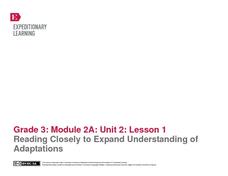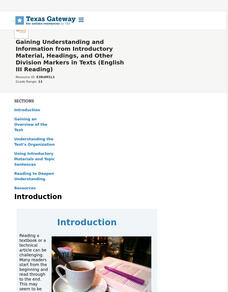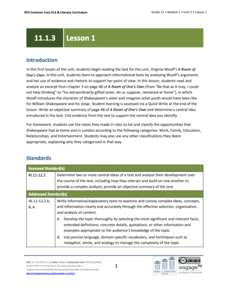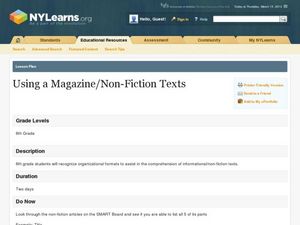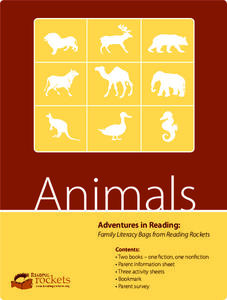Scholastic
The First Thanksgiving Feast
Following an online activity, scholars listen to a read-aloud of If You Were at the First Thanksgiving by Anne Kamma. Pupils discuss their family traditions and complete a T-chart comparing the holiday then and now. Collages are made to...
Houghton Mifflin Harcourt
Around Town: Neighborhood and Community: English Language Development Lessons (Theme 3)
Here is a unit designed to support English language development. Scholars speak, move, and write to learn more about topics that focus on community and local concepts. The series of lessons aids to reinforce concepts including consonant...
Curated OER
An Introduction to Nonfiction
Examine the elements of nonfiction writings in this lesson. Learners list common features of nonfiction and compare nonfiction and fiction books on the same topic. Create a Venn diagram comparing and contrasting the two genres.
Curated OER
Guided Reading: Three Little Pigs (Plus Wolf: Javalinas)
Guide your class through reading various versions of The Three Little Pigs. Talk about the traditional story line and then discuss a different point of view: Maybe the wolf was just an innocent bystander! This lesson plan, which has...
Curated OER
Check it Out...Nonfiction Can Be Fun!
Organizing information gathered for a research topic can be a challenge. Read aloud notes you have collected on a topic and use suggestions offer by the class to categorize and sort this information. Partners then follow this pattern,...
EngageNY
Reading Closely to Expand Understanding of Adaptations
Third graders work to determine the main idea, recall key details, and answer questions using an informational text on the topic of animal adaptations. Using the non-fiction text "Staying Alive: Animal Adaptations" (provided) the teacher...
Core Knowledge Foundation
Colonial Towns and Townspeople Tell It Again!™ Read-Aloud Anthology
A read-aloud anthology focuses on colonial towns and townspeople. Over three weeks, young scholars listen to stories, participate in discussions about town life, practice word work, and complete an extension activity with each lesson.
Curated OER
The Learning Network: Alligators Everywhere Fill-In
Meant to be used with the article, "In Florida, the Natives Are Restless" (included here), this is a great source of high-interest, nonfiction reading. A fill in the blank vocabulary activity and an activity focusing on reading...
Texas Education Agency (TEA)
Gaining Understanding and Information from Introductory Material, Headings, and Other Division Markers in Texts (English III Reading)
All teachers are teachers of reading! The 13-part interactive series ends with a lesson that teaches learners (and their instructors) how to approach reading their textbooks. After learning about several strategies, users test their...
EngageNY
Grade 11 ELA Module 1: Unit 3, Lesson 1
What was Shakespeare's youth like? Virginia Woolf considers the question in her nonfiction text, A Room of One's Own. Scholars begin reading Woolf's work before analyzing some of the text. Next, they write an objective summary and...
Curated OER
Express Yourself Lesson Seed 3
If you're looking to set your class up for writing effective arguments, try out this idea. While originally created with freedom as a guiding idea, the activity could easily be adapted for other themes. As a class, create a chart of...
EngageNY
Close Reading: Paragraph 4 of “Refugee and Immigrant Children: A Comparison”
Why is reading a text closely a helpful skill? Using the 13th of 20 lessons from the Grade 8 ELA Module 1, Unit 2 series, scholars continue reading the informational text "Refugee and Immigrant Children: A Comparison." They work with...
Curated OER
Using a Title to Determine Main Idea (Nonfiction)
Young readers explore a nonfiction text for its main idea. They will listen to the book Animal Sight by Kirsten Hall, and then observe as the teacher models a main idea think-aloud. Later, for independent practice, they listen to the...
Curated OER
Purposes of Reading Fiction and Nonfiction
How does the purpose of a fiction book differ from the purpose on a non-fiction text? Model for your young readers a scenario in which each kind of book might be useful or fun to read and show examples of each genre. A list of suggested...
PBS
Reading Adventure Pack: Government
A reading adventure pack looks closely at government with the help of two books—one fiction, one nonfiction, and a series of activities. Learners craft a mobile to visualize a balanced government, participate in a scavenger hunt around...
Curated OER
Identifying Features of Nonfiction Text
Learners explore nonfiction text. They identify the cover, title page, and table of contents of a nonfiction book. Pupils work in groups to create a chapter for a nonfiction class book about heroes.
Curated OER
Question What You Read
Readers test their reading comprehension after reading a nonfiction text about Paleo Indians. (This text is in Alabama: It's History and Geography, but other texts can be used.) After reading the nonfiction article as a class, they...
Curated OER
Using a Magazine/Non-Fiction Texts
Working with magazine articles and other informational texts, students identify the parts of a non-fiction work. The learners use SMART board files to guide instruction, as well as a transition to writing their own non-fiction article in...
Curated OER
Using Details from Nonfiction Text to Organize Sequence of Events
Is it important to do things in a certain order? Yes, especially when making a peanut butter and jelly sandwich. Or so your class will learn in a lesson plan on sequencing. After guided practice, class members generate their own “how-to”...
Curated OER
Build Mastery: Purpose for Reading
Do you agree? Set up three stations in your room for this reading comprehension activity: I agree, I disagree, and I'm not sure. Learners listen to statements and walk to the sign that best describes their response. Model this with an...
PBS
Reading Adventure Pack: Animals
Scholars explore the animal kingdom with help from two texts, Blueberries for Sal by Robert McCloskey and A Bed for the Winter by Karen Wallace. The literature and informational text set the learning stage for thoughtful discussion and...
Curated OER
Fears and Phobias
Take the fear out of reading with this series of three lessons from HotWire Magazine about fears and phobias. Each lesson contains pre-reading and post-reading activities aimed at improving learners' reading comprehension skills with the...
EngageNY
Grade 11 ELA Module 2: Unit 2, Lesson 12
Why is it important to make connections across texts? Scholars discover the answer with instructional activity 12 of 14 from the Grade 11 ELA Module 2: Unit 2 series. Pupils analyze the development of ideas in three nonfiction texts,...
Media Smarts
Media Awareness Network: Hate or Debate?
Discuss the difference between legitimate debate on a political issue and arguments that are based on hate through a science-fiction scenario that shows how a controversial issue can be discussed in both ways. Then learn how purveyors of...







